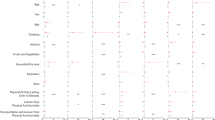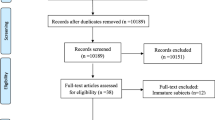Abstract
Study design
Retrospective, cross-sectional study.
Objectives
To investigate the factor structure of the ADAPSS-short form (ADAPSS-SF) in an acutely injured SCI population and to assess the relationship between cognitive appraisals made in the initial phase of rehabilitation and the experience of anxiety and depression.
Setting
National Spinal Injuries Centre, UK.
Method
Participants were acutely injured patients admitted to the NSIC over 35 months. Cognitive appraisals were measured using the ADAPSS-SF; psychological distress was measured using the HADS. Individual profiles, including demographics and injury characteristics, were collected.
Results
Principle Component Analysis with oblique rotation demonstrated a coherent two-factor structure of the ADAPSS-SF: resilience and loss. Correlational analysis found that individuals who negatively appraised their injury were more likely to report lower mood. Findings identified four vulnerable subgroups that were more likely to negatively appraise their injury: females, individuals older at the time of SCI, individuals with AIS-A injuries and individuals whose SCI was acquired through assault. Hierarchical regression analysis reported that resilience and loss factors were significant predictors of depression. Gender, resilience and loss factors were significant predictors of anxiety. Cognitive appraisals accounted for more variance in mood above biological markers.
Conclusions
Findings support a two-factor structure and validity of ADAPSS-SF in acute SCI rehabilitation. The study provides support for the role of cognitive appraisals in psychological adjustment in the early phases of rehabilitation, above injury characteristics. Findings highlighted the vulnerable subgroups that are more likely to initially endorse negative appraisals, which may influence clinical practice and provides an avenue for further research.
Similar content being viewed by others
Log in or create a free account to read this content
Gain free access to this article, as well as selected content from this journal and more on nature.com
or
References
Westie KS. Psychological aspects of spinal cord injury. Clin Prosthet Orthot. 1987;11:4.
Chevalier Z, Kennedy P, Sherlock O. Spinal cord injury, coping and psychological adjustment: a literature review. Spinal Cord. 2009;47:778–82.
Dean RE, Kennedy P. Measuring appraisals following acquired spinal cord injury: a preliminary psychometric analysis of the appraisals of disability. Rehabil Psychol. 2009;54:222–31.
Lazarus RS, Folkman S. Coping and adaptation. In: W. D. Gentry (Ed.), The handbook of behavioural medicine. New York: Guilford. 1984. p. 282–325.
Galvin LR, Godfrey HP. The impact of coping on emotional adjustment to spinal cord injury (SCI): review of the literature and application of a stress appraisal and coping formulation. Spinal Cord. 2001;39:615.
Duff J, Kennedy P. Spinal cord injury. In: Llewelyn SP, Kennedy P, editors. Handbook of clinical health psychology. Chichester: John Wiley and Sons; 2003. p. 251–78.
Holroyd KA, Lazarus RS. Stress, coping and somatic adaptation. In: L Goldberger and S Breznitz (Eds), Handbook of stress: theoretical and clinical aspects. New York: 1982. p. 21–35.
Kennedy P, Lude P, Elfström ML, Smithson E. Cognitive appraisals, coping and quality of life outcomes: a multi-centre study of spinal cord injury rehabilitation. Spinal Cord. 2010;48:762–9.
Kennedy P, Kilvert A, Hasson L. A 21-year longitudinal analysis of impact, coping, and appraisals following spinal cord injury. Rehabil Psychol. 2016;61:92.
Kennedy P, Evans M, Sandhu N. Psychological adjustment to spinal cord injury: the contribution of coping, hope and cognitive appraisals. Psychol Health Med. 2009;14:17–33.
Kennedy P, Smithson E, McClelland M, Short D, Royle J, Wilson C. Life satisfaction, appraisals and functional outcomes in spinal cord-injured people living in the community. Spinal Cord. 2010;48:144.
Ferguson E, Matthews G, Cox T. The appraisal of life events (ALE) scale: reliability and validity. Br J Health Psychol. 1999;4:97–116.
Kennedy P, Rogers BA. Anxiety and depression after spinal cord injury: a longitudinal analysis. Arch Phys Med Rehabil. 2000;81:932–7.
Kennedy P, Hamilton LR. The needs assessment checklist: a clinical approach to measuring outcome. Spinal Cord. 1999;37:136–9.
Mignogna J, Christie AJ, Holmes SA, Ames H. Measuring disability-associated appraisals for veterans with spinal cord injury. Rehabil Psychol. 2015;60:99.
Zigmond AS, Snaith RP. The hospital anxiety and depression scale. Acta Psychiatr Scand. 1983;67:361–70.
Sparrow SS, Balla DA, Cicchetti DV, Harrison PL, Doll EA. Vineland adaptive behavior scales. Circle Pines, MN: American Guidance Service.
Hogarty KY, Hines CV, Kromrey JD, Ferron JM, Mumford KR. The quality of factor solutions in exploratory factor analysis: the influence of sample size, communality, and overdetermination. Educ Psychol Meas. 2005;65:202–26.
Kaiser HF. The application of electronic computers to factor analysis. Educ Psychol Meas. 1960;20:141–51.
Munce SE, Webster F, Fehlings MG, Straus SE, Jang E, Jaglal SB. Perceived facilitators and barriers to self-management in individuals with traumatic spinal cord injury: a qualitative descriptive study. BMC Neurol. 2014;14:48.
Mental Health Foundation. Fundamental facts about mental health 2016. London, UK: Mental Health Foundation; 2016.
Kennedy P, Nolan M, Smithson E. Psychological adjustment to spinal cord injury in Ireland: quality of life, appraisals and coping. Ir J Psychol. 2011;32:116–29.
Schönenberg M, Reimitz M, Jusyte A, Maier D, Badke A, Hautzinger M. Depression, posttraumatic stress, and risk factors following spinal cord injury. Int J Behav Med. 2014;21:169–76.
Williams RT, Wilson CS, Heinemann AW, Lazowski LE, Fann JR, Bombardier CH. PRISMS Investigators. Identifying depression severity risk factors in persons with traumatic spinal cord injury. Rehabil Psychol. 2014;59:50–6.
Bombardier CH, Ehde DM, Stoelb B, Molton IR. The relationship of age-related factors to psychological functioning among people with disabilities. Phys Med Rehabil Clin N Am. 2010;21:281–97.
Kraft R, Dorstyn D. Psychosocial correlates of depression following spinal injury: a systematic review. J Spinal Cord Med. 2015;38:571–83.
Geyh S, Kunz S, Müller R, Peter C. Describing functioning and health after spinal cord injury in the light of psychological–personal factors. J Rehabil Med. 2016;48:219–34.
White NH, Black NH. Spinal cord injury (SCI) facts and figures at a glance. National Spinal Cord Injury Statistical Center, Facts and Figures at a Glance. Birmingham, AL: University of Alabama at Birmingham, 2016.
Acknowledgements
We would like to thank all the patients and staff at The National Spinal Injuries Centre, Stoke Mandeville Hospital, who participated in this research, and notably the Department of Clinical Psychology, who manages and coordinates the NAC and goal planning programme at the National Spinal Injuries Centre.
Author contributions
RE was responsible for designing the study, conducting data analysis, interpreting the results, writing and revising the manuscript, updating reference lists and creating summary tables, and approval of the final manuscript. KJ was responsible for designing the study, overseeing data collection, interpreting the results, writing and revising the manuscript, and approval of the final manuscript. JD was responsible for developing the research conception, overseeing data collection contributed to the revision of the manuscript and approval of the final manuscript. All authors agreed to be accountable for all aspects of the work in ensuring that questions related to the accuracy or integrity of any part of the work are appropriately investigated and resolved.
Author information
Authors and Affiliations
Corresponding author
Ethics declarations
Conflict of interest
The authors declare that they have no conflict of interest.
Rights and permissions
About this article
Cite this article
Eaton, R., Jones, K. & Duff, J. Cognitive appraisals and emotional status following a spinal cord injury in post-acute rehabilitation. Spinal Cord 56, 1151–1157 (2018). https://doi.org/10.1038/s41393-018-0151-6
Received:
Revised:
Accepted:
Published:
Version of record:
Issue date:
DOI: https://doi.org/10.1038/s41393-018-0151-6
This article is cited by
-
Anxiety and adjustment following SCI: a transdiagnostic psychological intervention combining Cognitive Behavioural Therapy (CBT) and Coping Effectiveness Training (CET)
Spinal Cord Series and Cases (2025)
-
The influence of psychological need on rehabilitation outcomes for people with spinal cord injury
Spinal Cord (2023)
-
Illness perception of individuals with spinal cord injury (SCI) during inpatient rehabilitation: a longitudinal study
Spinal Cord (2022)
-
Cognitive appraisals of disability in persons with traumatic spinal cord injury: a scoping review
Spinal Cord (2022)
-
Which factors have an association to the Quality of Life (QoL) of people with acquired Spinal Cord Injury (SCI)? A cross-sectional explorative observational study
Spinal Cord (2021)



